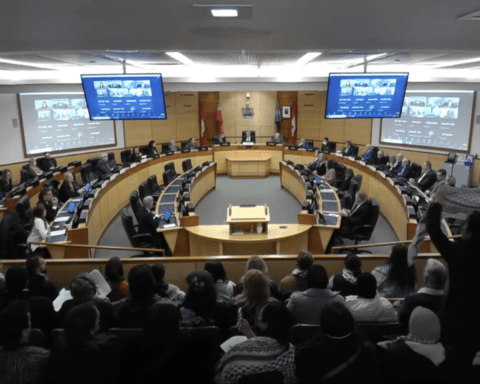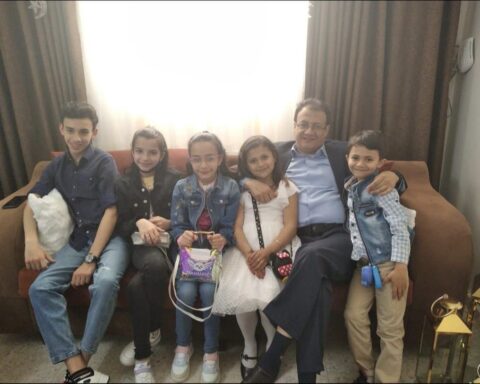In this week’s round-up of what’s been making headlines in Canada’s ethnic media: the Black community reflects on the shortcomings of Black History Month; groups react to the passing of a federal motion denouncing sanctions against Israel; and migrants ask for amnesty after years without status.
Black History Month needs an overhaul, community says
Members of Canada’s Black community say Black History Month fails to educate Canadians about slavery and mobilize them to be more active against discrimination.
At the 15th Black History Month concert in Brampton, Ontario on Feb. 20, Justice Donald McLeod highlighted problems that the Black community faces and needs to address with more vigilance.
As reported by Pride, McLeod noted that Blacks earn approximately 76 cents for every dollar earned by a white worker; that Blacks account for ten per cent of inmates in Canadian prisons but only three per cent of the population; and that Black boys drop out of high school at a rate of 40 per cent.
“We have to do our best to make sure that Black History Month is not just lived out in the 29 days, but it’s actually lived out in the whole year so that our kids will realize that what we expect is that they stand head and shoulders above everybody else,” he said.
“It was radical, revolutionary, loud.”
On Feb. 18, the Government of Ontario passed legislation to formally recognize February as Black History Month.
“People in our communities have recommended that February be a celebration of ‘Black Liberation’ or ‘African Liberation,’ rather than ‘Black History,’” Toronto Star columnist Desmond Cole wrote on the same day.
Black History Month doesn’t acknowledge how Black people escaping slavery in the United States faced racism in Canada and how the community continues to experience discrimination, Cole noted.
“There’s a tendency to focus on the quiet resilience of Dr. Martin Luther King and others like him, but the struggles of Civil Rights activists were not quiet,” said George Randolph, founder of Randolph Academy of the Performing Arts.
“It was radical, revolutionary, loud — those are the voices I’d like to see us focus more on.”
Randolph is one of three Black artists who shared their impressions of Black History Month with the Caribbean Camera.
Liberals criticized for condemning Israel sanctions movement
Canada’s Liberal Party is garnering praise as well as criticism for supporting a Conservative motion to condemn the Boycott, Divestment and Sanctions (BDS) movement against Israel.
As the Canadian Jewish News reports, the motion passed on Feb. 22 by a 229–51 vote. The New Democratic Party voted against the motion, as did the Bloc Québécois and three Liberal Members of Parliament (MPs). Several Liberal MPs did not vote.
The BDS movement is a global campaign that seeks boycotts, divestment and sanctions against “Israel until it complies with international law and Palestinian rights.”
According to the Conservative motion, BDS “promotes the demonization and delegitimization of the State of Israel.”
The New Democratic Party voted against the motion, as did the Bloc Québécois.
“BDS is a non-violent campaign that supports proven methods of conscientious objection to encourage Israel to respect international law,” wrote the National Council on Canada Arab Relations (NCCAR) in a press release following the vote. It notes that Canadians have supported past BDS movements, notably against South African apartheid.
“At its core, the vote on the anti-BDS motion would go against the spirit of Freedom of Speech, a right enshrined in Canada’s Charter of Rights and Freedoms,” stated the NCCAR.
Palestine News Network reported that, on the same day of the vote, members of the Student Society of McGill University, “which has one of the highest Jewish populations of any university in Canada,” passed a motion in support of BDS.
The motion asks McGill University to divest from “profiting from violations of Palestinian human rights.” According to the Montreal Gazette, McGill administration said that the motion does not oblige the university to change its policies.
Members of the McGill BDS Action Network told the Gazette that the vote demonstrates that the students do not agree with the government’s stance.
Migrants demand same amnesty given to Syrian refugees
As the Trudeau government reaches its goal of welcoming 25,000 Syrian refugees to Canada this week, some are calling on the government to extend the same amnesty to migrants who have been without status in Canada for years.
In an open letter published in Canadian Immigrant, Odhiambo Agunga commended the government for its compassion towards Syrian refugees, but noted that other refugees like himself have been struggling to get by without status, their claims “either forgotten or ignored.”
The letter blames much of the backlog on the former Conservative government, who Agunga said reduced refugees to second-class humans.
In another op-ed published in the Toronto Star, two psychiatrists called on the government to stop detaining migrants without charges.
“At a time when Canadians have opened up their arms to support and protect Syrian families, we cannot ignore the practices that are taking place behind closed bars, out of sight of the generous welcomes and flashing cameras,” wrote Dr. Michaela Beder and Dr. Rachel Kronick.
Agunga says migrant claims have largely been “either forgotten or ignored.”
They said that detention for administrative purposes can lead adults to develop psychiatric problems such depression, anxiety and post-traumatic stress disorder.
“We have watched previously healthy children deteriorate: in one study, most children had trouble sleeping, some stopped speaking, many wouldn’t eat, others developed behavioural problems, separation anxiety and exhibited signs of trauma,” they wrote.
Agunga pointed out that getting medical treatment without status is expensive: “No hospital or any medical institution in Canada will admit us as patients without down payment even if we are sick and dying yet we all pay taxes which covers these health care services.”
The Liberal government announced on Feb. 18 that it would restore health-care coverage for all refugees and asylum claimants to pre-2012 levels in April, as reported by the Toronto Star.
Agunga wrote that migrants also need to be given amnesty to go to school, obtain driver’s licenses, get credit cards, vote “and more so to be able to reunite with our beloved families scattered all over the world.”





